Are you starting a career in data science?
Just thinking about the first step can leave you dazed and confused, especially if you lack previous experience in the field.
With so many different data science careers to explore, you might find yourself wondering which is the right one for you and if you’ve got what it takes to fit the profile.
Is Data Science for Me?
Well, we’ve all asked ourselves that question when we were at square one of our data science learning path. And we haven’t forgotten that every expert was once a beginner.
So, this data science career guide has a three-fold purpose:
- Show you why data science opportunities are worth exploring;
- Inform you about the different careers in data science and boost your efficiency in discovering suitable data science roles;
- Give you the know-how you need to pursue your professional data science path.
How to navigate the data science career guide
We did our best to give you the most comprehensive data science career guide out there.
We researched dozens of books, hundreds of articles, and thousands of report pages on careers in data to make sure you have everything you need to get on the track to data science career success. However, we realize that this is a truly massive amount of information. Of course, we’ll be ecstatic if you want to read the whole article from the headline to the last full stop. But just in case you wish to go straight to the parts that interest you most, you can use the navigation below.
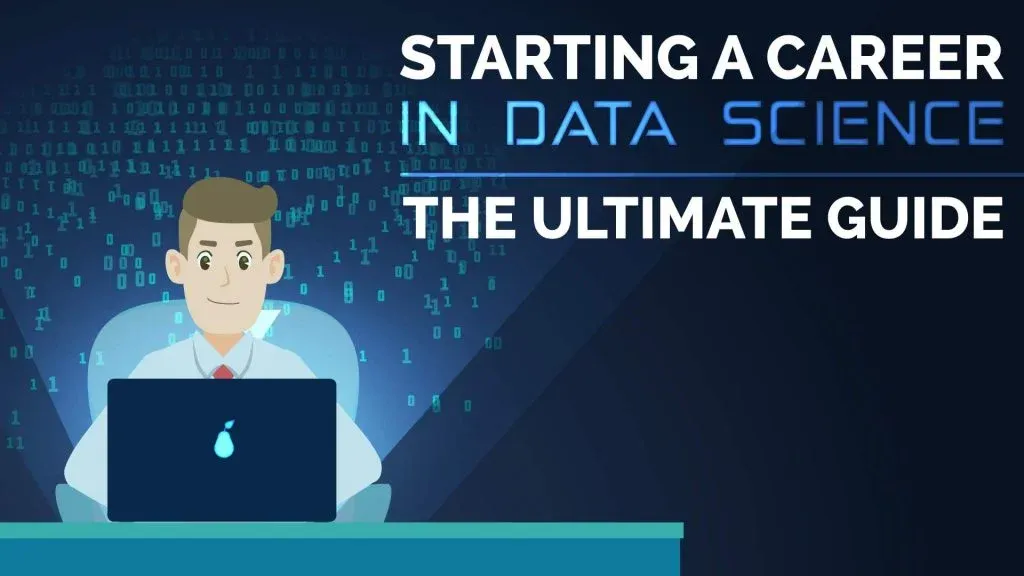
Data Science Career Guide
- Why is data science a good career to explore?
- Why is data science important?
- Who can use data science?
- What are the top 5 data science career opportunities to explore?
Why is data science a good career to explore?
Advancements in technology helped data science evolve from cleaning datasets and applying statistical methods to a field that encompasses data analysis, predictive analytics, data mining, business intelligence, machine learning, deep learning, and so much more. Now, there still might be some who think that data science is just a trend and the hype around it will eventually go away. Of course, nothing could be farther from reality. The truth is, data science is just gaining speed as all businesses (and government organizations) use enormous volumes of data to improve what they do and how they do it. But what makes data science the magic ingredient for success? Here are two tangible examples.
Formula 1
The Brazilian Grand Prix 2012. Red Bull’s Sebastian Vettel suffers the worst possible start, his car spinning out of control and losing its front wing on his opening lap. Vettel suddenly drops down to last. All seems doomed for the champion. However, the German somehow manages to recover and finish sixth, which grants him just enough points to snatch the world title for the third year in a row in the most dramatic fashion. Fierce driving or luck?
Nope. That’s data science.
Turns out, by the time Vettel made it to his 10-th lap pit stop, a team of brilliant data engineers had already used modeled data to run simulations. Thus, they were able to analyze what adjustments were necessary to keep Sebastian’s Renault going for the remaining 70 laps. What a huge victory fueled by data!
Caesars Casino
Caesars Entertainment Corporation was the fourth-largest gaming company in the world in 2013, with annual revenues of $8.6 billion. Based in Nevada, US, it runs more than 50 hotels and casinos around the world, some of them at the most lucrative locations in Las Vegas.
But do you know what Caesar’s most valuable asset is?
It’s their database, giving indispensable insight into 45 million hotel and casino customers’ behavior and spending patterns.
The corporation used 17 years of gathering information to build “an automated, targeted marketing strategy for every individual customer, using data to understand who they are, and then predictive modeling to assess the best way to incentivize them to spend money.” (Marr, 2016)
What does this mean in practice?
Well, if you’re a client with a high lifetime value that happens to have lost all their luck, dignity, and money at the Blackjack table, you’ll most certainly be approached by a staff member. They’ll immediately lift your spirits by serving you your favorite drink. Or they’ll hand you free tickets to an evening entertainment program, and even offer you other free perks they know your heart desires. That way, Ceasar makes sure you’re happy and satisfied and keeps you coming back for more.
Why is data science important?
Data science isn’t just restricted to the F1 racetrack or the big casino business players. In fact, there is virtually no industry that can’t benefit from it. Retail and e-commerce, logistics and transportation, healthcare, finance, insurance, real estate – all these need a strong data science team that can leverage the data within their organization to gain a competitive advantage. That’s why, if you’re looking for a rewarding career with a strong impact on any business decision-making process, you should definitely explore the data science career path.
Who can use data science?
You can. And your employer certainly can, too.
In fact, the latter will welcome you with open arms, once they realize you’re brave and qualified enough to tame the tide of unstructured, semi-structured, and structured data, and use data insights to drive change. Of course, it goes without saying that those changes should lead to measurable results. After all, every company wants to ensure the well-being of their business, right?
Now, we want to help you be the person that every big data science company or fast-growing startup would gladly hire on their team. So, how do you get into the data science field? Fortunately, there are numerous ways to do that. Some involve waltzing through the impressive “Data Science Leviathan” door, whereas others help you secure a career in data science through less demanding paths.
What are the top 5 data science career opportunities to explore?
To help you sort things out, we’ve featured the top 5 in-demand types of data science jobs – data analyst, BI analyst, data engineer, data architect, and, of course, data scientist.
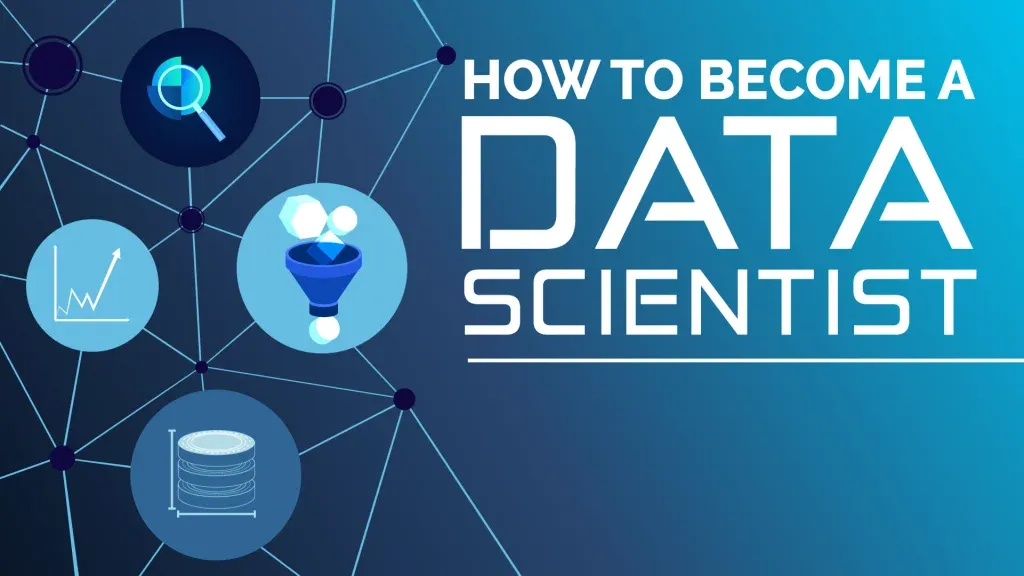
Who is a data scientist?
Ever wondered how to become a data scientist? Also known as the Data Science Unicorn, a data scientist offers an unmatched blend of skills, much to the satisfaction of their employer. Data scientists not only understand the language of data, but they can also analyze it and draw actionable insights from it. Moreover, they’ve mastered the art of data storytelling to a level that makes both management and stakeholders nod in agreement and plan their strategy accordingly.
What does a data scientist do?
Practically everything.
Data scientists have a strong curiosity and a passion for achieving practical business impact. In addition, they boast exceptional judgment combined with an analytical mindset.
But what sets apart the best from the rest is a knack for creative problem solving and willingness to learn new technologies and skills.
Why is that so important?
Because data scientists must use machine learning models to solve challenging problems in all business areas. Moreover, they are real champions in utilizing statistical natural language processing to mine unstructured data and extract insights. Which doesn’t mean they don’t also deal with structured data. In fact, it’s quite the contrary. Data scientists model structured data with advanced statistical methods and algorithms to perform analyses. Then, they interpret the results and visualize the data to tell the most compelling stories to management and stakeholders to achieve the company’s business goals.
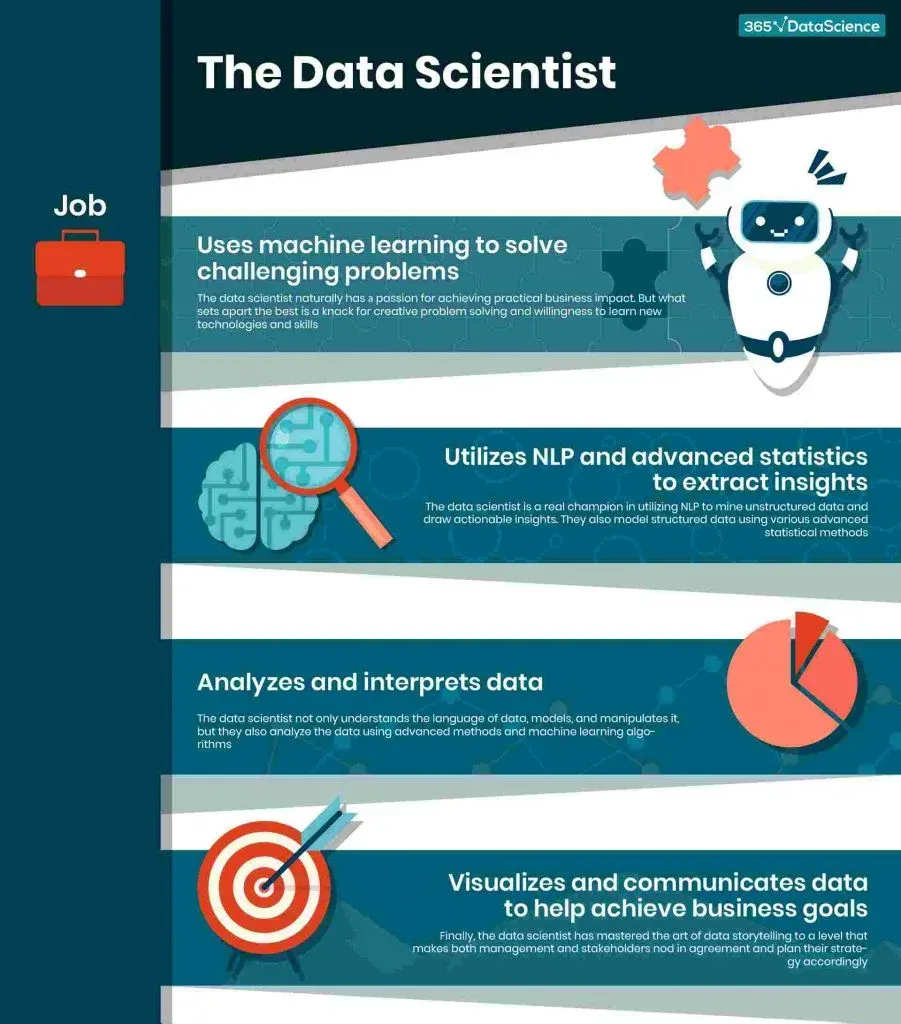
Data scientist salary – How much does a data scientist earn?
How much do data scientists make?
Here are the numbers, according to Glassdoor and Payscale.
As a data scientist in the U.S., even with zero experience, you can get a \$10,000 annual bonus on top of your \$100,000 average annual pay. And, just in a few years’ time, your earnings can increase to \$118,000, plus \$12,000 in bonuses! (Pay for data scientists varies by state and region. If you want to take a closer look, you can find a detailed list in UC Berkeley's article.)
You've set your gaze to London’s Big Ben and the UK? With no previous experience as a data scientist, you can expect to earn an average total compensation of £33,813. And once you have 1-4 years behind your back, your average total compensation will rise to £39,573.
Overall, the data scientist career outlook is undeniably positive. No wonder “data scientist” was coined the sexiest job out there!
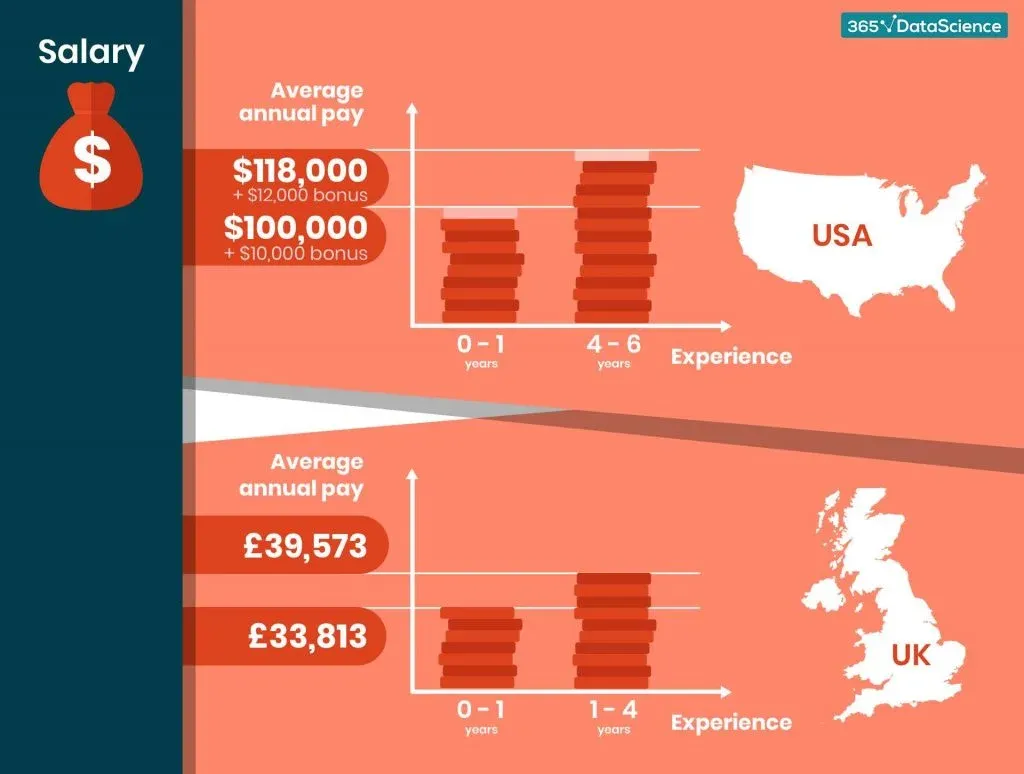
What’s the data scientist career path?
You can start as data architects or data analysts, and gradually work their way up to this coveted job. In any case, if you’re aiming at the data scientist position, here’s everything you need to know to get started on the right career track.
How to become a data scientist?
Everybody wants to know how to be a data scientist. Well, maybe not literally everybody, but this is undeniably the most sought-after career in the data science field at the moment, as the demand for data scientists is constantly growing. Data scientists are independent and impactful, and If you want to get hired as one, you’re probably wondering what the data scientist duties are, how to acquire the necessary skills to apply for data scientist positions and if the salary will meet your expectations.
Is data scientist a good career? To save you browsing through job boards and career websites to find the various information you need, we created this ‘data scientist snapshot’. We believe it will give you the insights you need to decide if the data scientist role fits your career needs and aspirations.
What education do you need to become a data scientist?
For starters, you don’t need a Master’s or a Ph.D. degree to become a data scientist. If you already have it – great! It’s certainly a plus! However, a Bachelor’s degree is good enough to get you on the data scientist path.
According to our extensive research on how to be a data scientist, a background in the following disciplines increases your chances of landing a data scientist job:
- Economics and social sciences, which includes economics, finance, business studies, politics, psychology, philosophy, history, and marketing and management;
- Natural science, including physics, chemistry, and biology;
- Statistics and mathematics;
- Computer science;
- Engineering;
- Data science and analysis, which includes machine learning.
The good news is that even students from entirely different areas of studies, hold a very good chance of becoming data scientists. According to data from successful data scientists’ LinkedIn profiles, 43% have completed at least one data science online course with 3 certificates being the average.
So, if you’ve never written a line of code in your life, you can still make up for it with determination and commitment to learning…And ultimately start a career in data science.
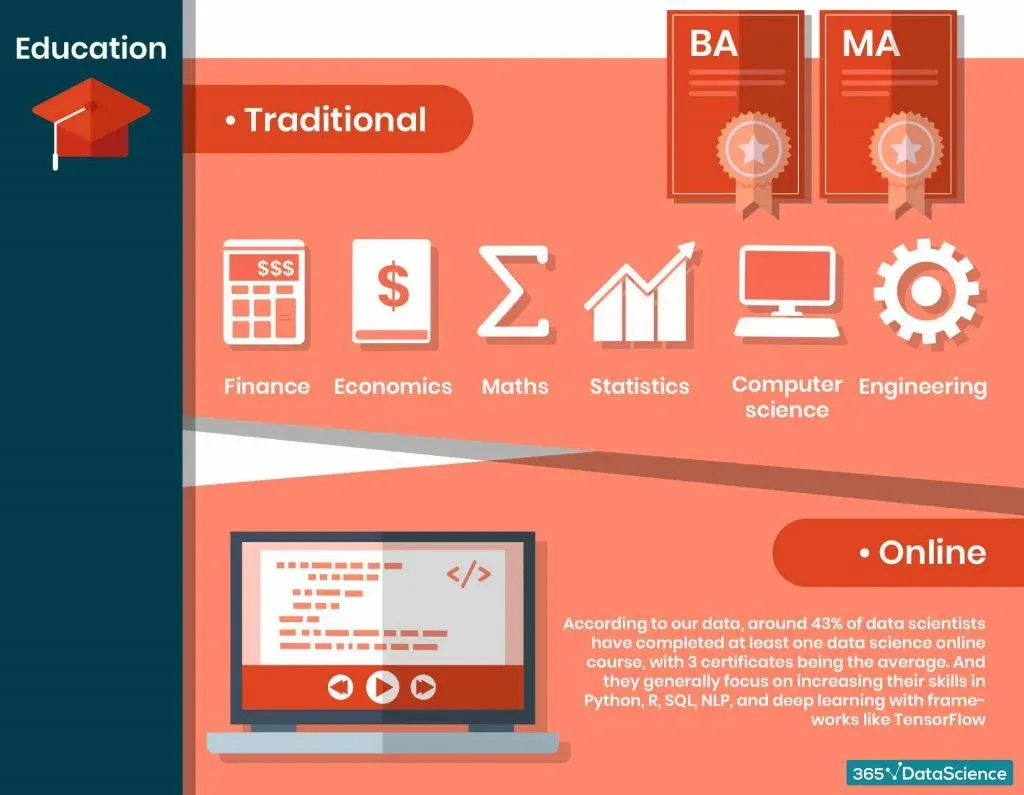
What data scientist qualifications you should acquire?
Data scientists are famous for their robust skillset and competences. So, here are the must-have qualifications you need to become a data scientist.
Technical skills
- Excellent programming skills in R or Python and its data science libraries (Pandas, scikit-learn);
- Experience with relational databases and SQL;
- Experience in MATLAB;
- Advanced practical knowledge of data science and machine learning /AI development frameworks;
- Excellent analytical and learning skills;
- Experience in Deep Learning frameworks (e.g. TensorFlow);
- Experience with NLP algorithms and techniques is an advantage.
Practical skills
- Ability to start initiatives;
- Integrity and confidentiality;
- Desire to drive innovation and generate unique solutions;
- Growth mindset;
- Ability to track and share external trends, best practices or ideas;
- Drive for performance;
- Accountability;
- Ability to thrive under pressure and fast pace;
- Ability to take an unpopular stance.
Soft skills
- Strong written and verbal communication skills
- Leadership skills;
- Ability to develop and leverage relationships with stakeholders to achieve a company’s business goals;
- Ability to inspire others and support others' development to achieve full potential;
- Readiness to collaborate closely with engineering and BI teams.
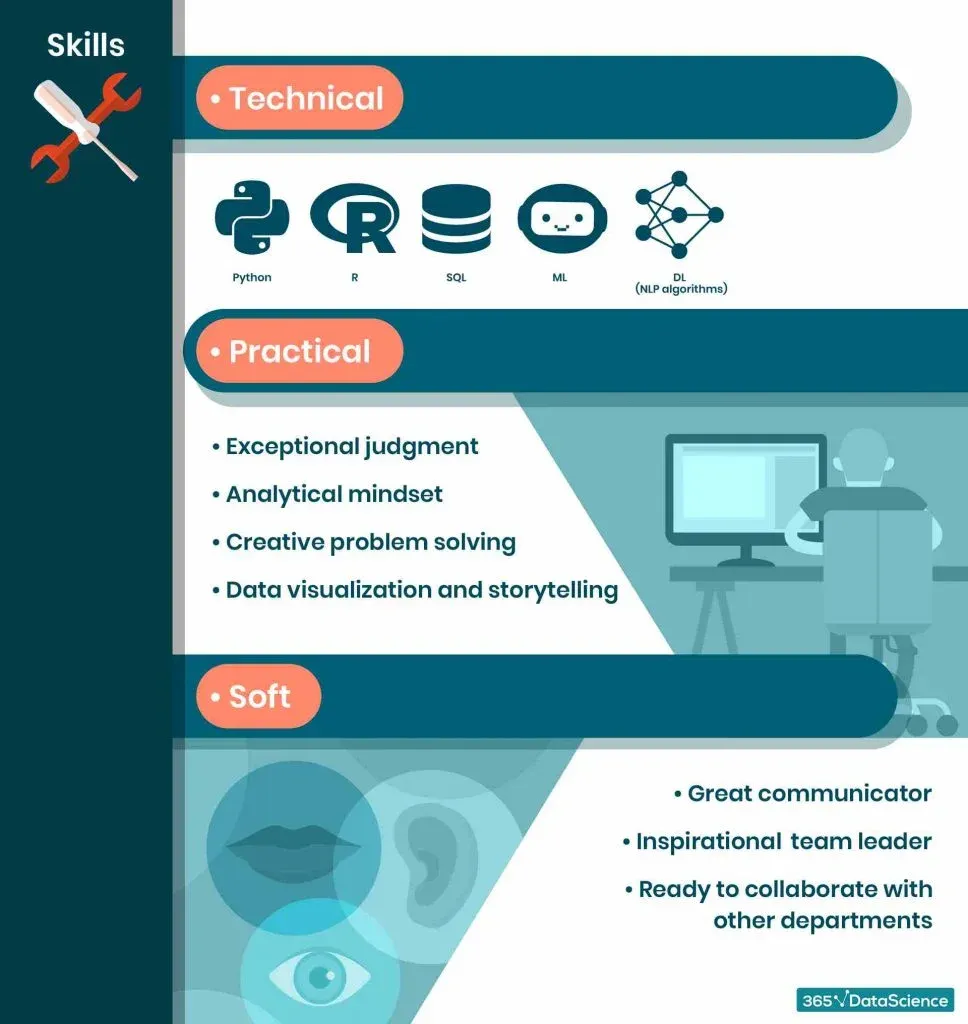
Well, now that you’ve got a good idea of what it’s like to be a data scientist and how to become one, you should feel more confident and determined on your path. However, if you feel you need additional data scientist career tips and advice, just scroll down the data science career guide. We believe you’ll find information that can help you at any stage of your data scientist job application process.
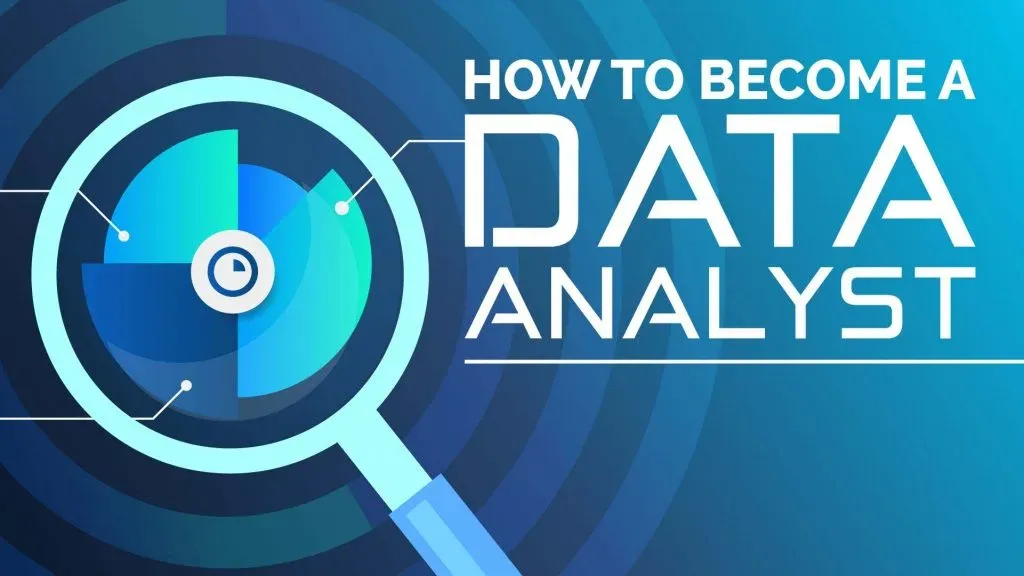
Who is a data analyst?
Data analysts are the real troopers of data science. They’re the ones who are involved in gathering data, structuring databases, creating and running models, and preparing advanced types of analyses to explain the patterns in the data that have already emerged. A data analyst also overlooks the basic part of predictive analytics.
What does a data analyst do?
Well, quite a lot. A data analyst is both a thinker and a doer who doesn’t hesitate to roll up their sleeves and dig into the numbers. Data analysts extract and analyze data with a “can do” approach and then present data-driven insights to underpin decision making. They also develop and build analytics models and approaches as the basis for a company’s strategy and vision. On top of that, they are often responsible for identifying and extracting key business performance, risk and compliance data, and converting it into easy-to-digest formats. So, as you can see, agility to shift between strategic projects and operational activities a must.
Sounds a bit lonely? Think again. Data analysts are great team players and work closely with various departments and leaders within the organization. That’s super important if they want to be effective in this role. So, the ability to communicate well and influence is critical.
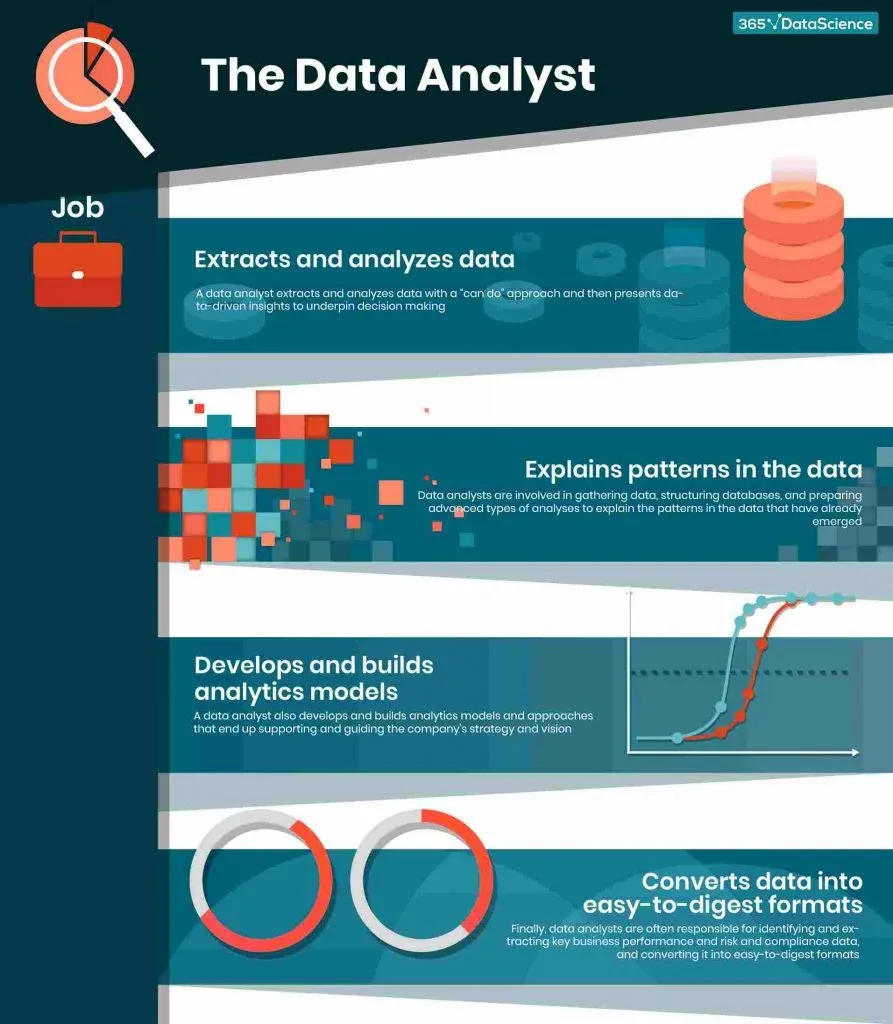
Data analyst salary – How much does a data analyst earn?
How much do data analysts make?
Glassdoor and PayScale were kind enough to share their insights.
If you’re taking the first steps in your data analyst career, you can expect an average pay of $57,000.
As you reach 4-6 years of experience, your compensation will also go higher (\$68,000 median annual salary and an average bonus of \$4,705).
You’re based in the UK? The average compensation for data analysts with less than 1 year of experience (including bonuses and overtime pay) is £23,870. In terms of data analyst job growth, if you already have 1-4 years of experience as a data analyst, you can expect annual earnings of £25,853. So, it looks like the data analyst path is worth exploring!
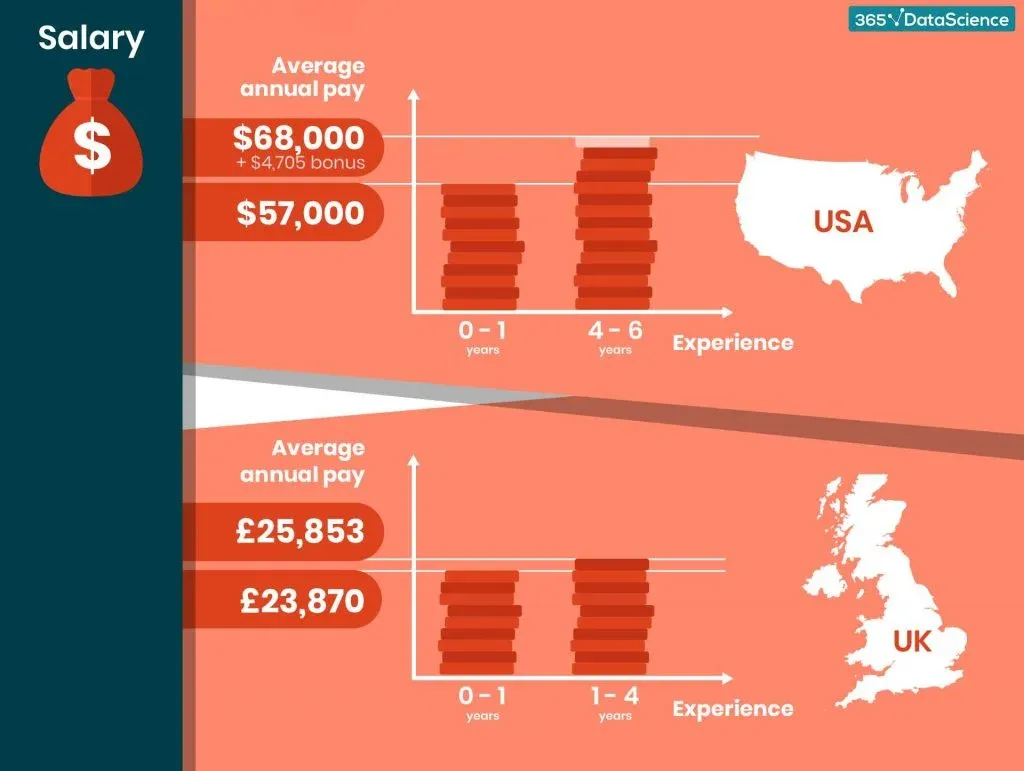
What’s the data analyst career path?
A budget analyst or a compensation and benefits analyst can be a starting point to your data analyst career. But, in any case, if you wish to advance on the data analytics career path, here’s all you need to learn in terms of education and data analyst skillset requirements.
How to become a data analyst?
Considering a career as a data analyst?
That’s certainly a great option to explore, both on its own and as a gateway into data science. However, there are a few questions you need the answers to if you want to make sure that a career in data analytics is the best career path for you. So, this overview is designed to confirm the fundamentals of data analytics careers for you: what a data analyst does, what education is preferable or required, how to get into data analytics, and what skills will get you hired. We also discuss what salary you can expect over your data analyst career progression. Effectively, this overview gives you the insight you need to make up your mind and initiate the first steps towards a successful data science career.
What education do you need to become a data analyst?
If you consider becoming a data analyst, a Bachelor's degree in IT, computer science or statistics will give you a strong advantage. However, equivalent experience in data and business analytics also fit the bill. The good news is, even if you lack the background and the experience, you still have a good chance of getting a job as a data analyst. There are various ways to learn, such as taking qualification courses or enrolling in a comprehensive online training covering everything from statistics and Excel to SQL, Python, and Tableau.
In fact, the latter will increase your chances to land an internship at a high-profile company and build your career from the ground up. Maybe an entry-level position isn’t how you imagined launching a successful career as a data analyst. But this just may be the best way to achieve your goal. In most companies, you’ll be able to gain valuable experience and take advantage of many in-house training opportunities. So, the important thing is to stay curious and keep on learning. Real-world experience, exposure to the latest software programs, and communicating with experts in the field will expand your knowledge and put you on the data analyst track.
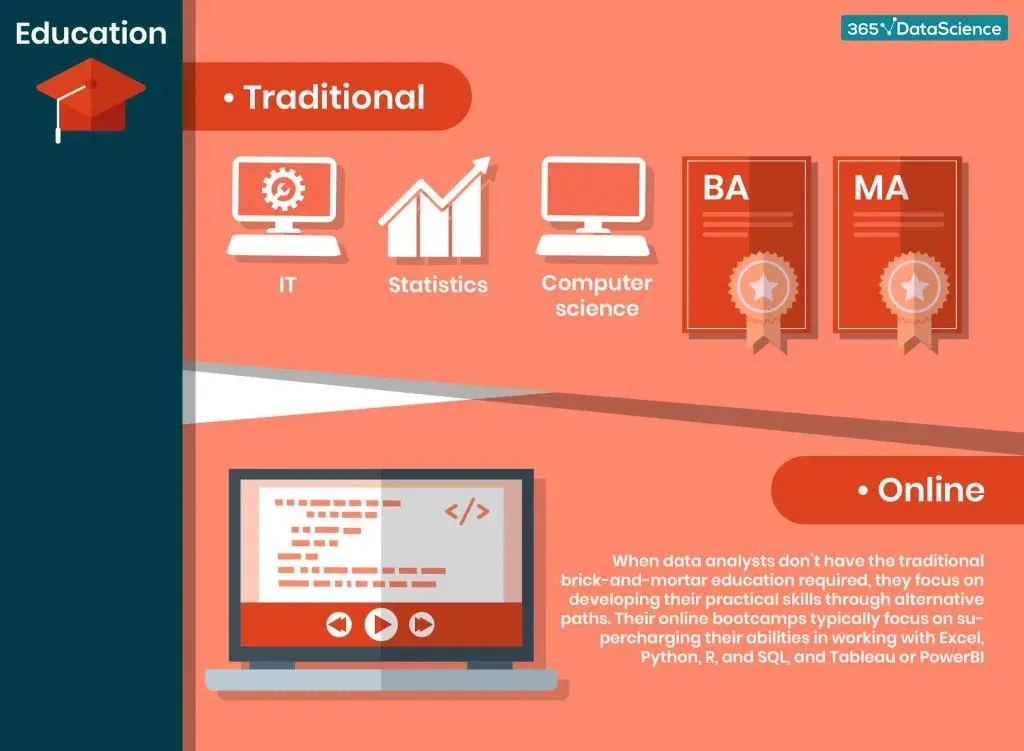
What data analyst qualifications you should acquire?
As a data analyst, you’ll have plenty of tasks to juggle on a daily basis. So, here are the qualification and skills you need to become a data analyst and handle all that data.
Technical skills:
- Programming and coding language skills using Python, R, etc.;
- Expertise in SQL and a good understanding of how relational database management systems work;
- Experience with large datasets and distributed computing;
- Excellent Excel skills and ability to use advanced analytics and formulas;
- Experience with extracting and analyzing data from diverse sources (multiple data marts and file formats);
- Knowledge of statistics and statistical software packages, quantitative methods, confidence intervals, sampling and test/control cells;
- Predictive modeling.
Practical skills:
- Strong attention to detail and ability to quality check your own work to ensure data mistakes are caught prior to work delivery;
- Advanced analytical and data interpretation skills;
- Ability to stay organized and deliver within agreed timeframe and scope;
- Hands-on, problem-solving skills;
- Ability to initiate and drive projects to completion with minimal guidance;
- Ability to communicate the results of analyses in a clear and effective manner;
- Confidentiality and personal integrity (a key competency, especially if your job requires managing sensitive data);
- Confidence to challenge thinking and offer opinions, thoughts, and insight;
- Prioritization skills;
- A proactive approach to resolving problems;
- Quick learning skills.
Soft skills:
- Excellent communication skills – both verbal and written;
- Ability to articulate complex concepts in a clear and concise manner;
- Ability to collaborate effectively in any work environment;
- Good listening skills.
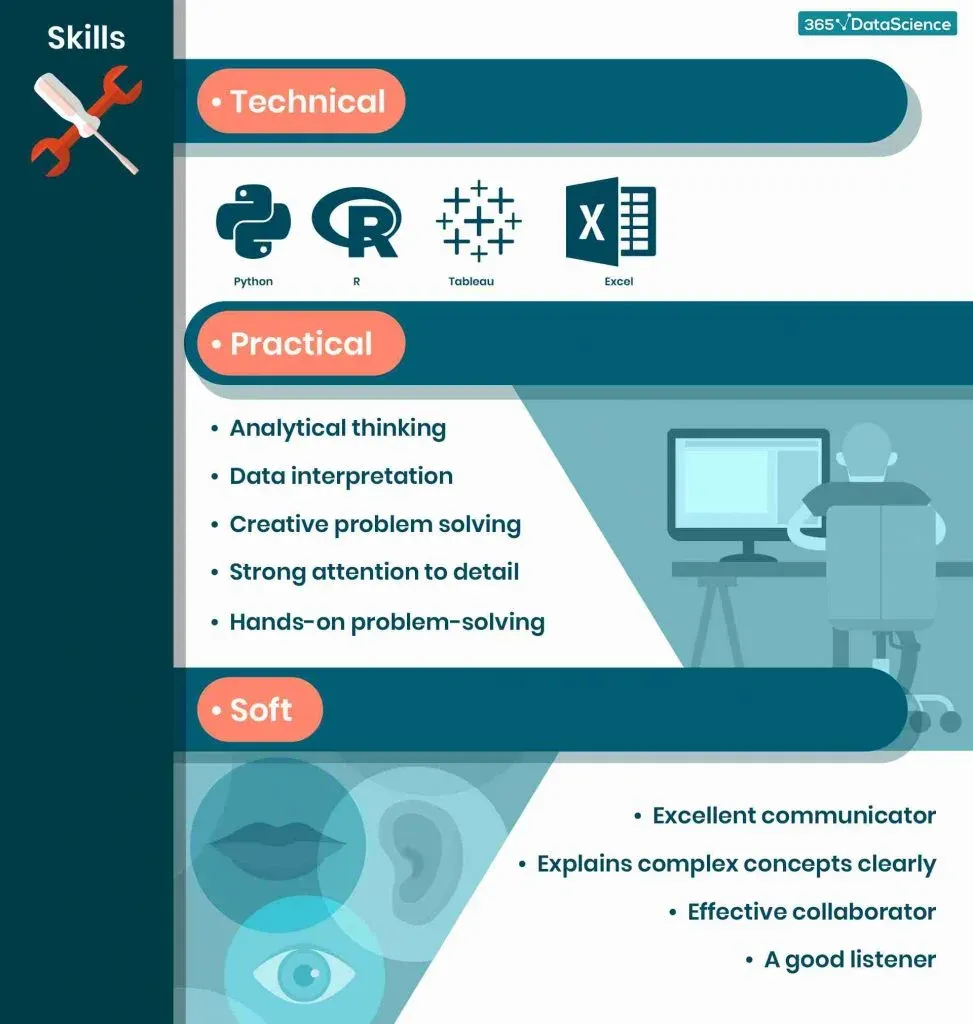
Now you’re aware of the most important aspects of a data analyst job and how to become one. However, in order to be successful, you still may need additional career advice on top of the skills needed for data analyst. So, if you feel like you need further preparation, you can jump to the later sections of the data science career guide. We are sure those will come in handy as a quick reference once you start sending out application forms and going to interviews.
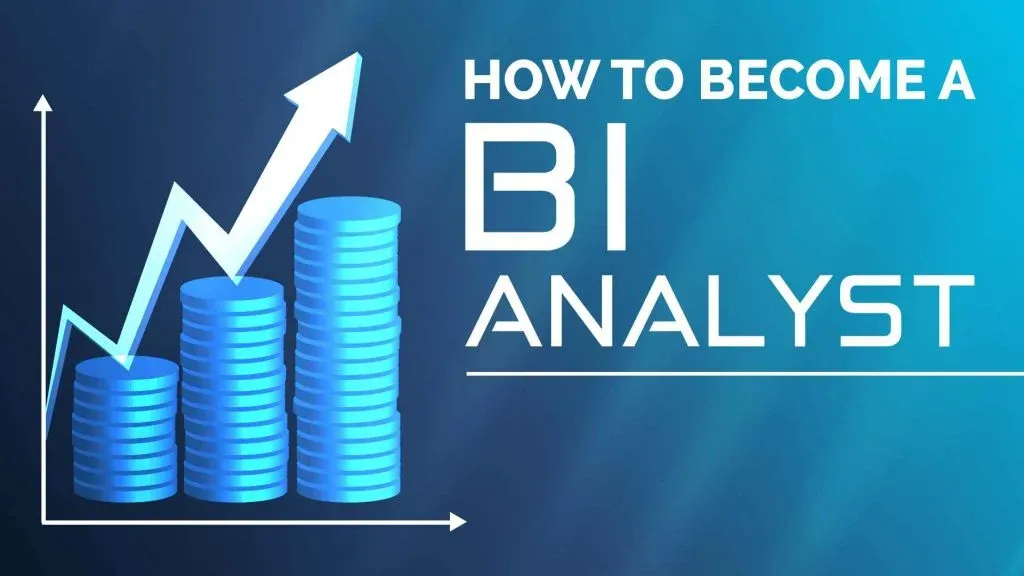
Who is a BI analyst?
A BI analyst is the best friend of business performance, focusing primarily on analyses and reporting of past historical data. Once the relevant data is in the hands of the BI Analyst (monthly revenue, customer, sales volume, etc.), they must quantify the observations, calculate KPIs and examine the measures to extract insights from their data.
What does a BI analyst do?
Data is business and business is data. That’s probably every BI analyst’s motto.
BI analysts possess a blend of business vision, consultant abilities and profound understanding of data. Not to mention they are fierce Tableau ninjas. Their job often requires work alongside senior management to shape and develop a data strategy. Analysis of Key Performance Indicators (KPIs), accurate overview of business performance and identifying areas that need improvement are all in the BI analyst’s domain.
But that’s not all. Another part of a BI analyst’s job is to continually improve their company’s competitive positioning. Therefore, they examine their competitors, data trends, seasonality, and other random effects to quickly identify issues and best practices.
On top of that, they create killer graphs and dashboards to review major decisions and measure effectiveness. Do you want to have an impact on the business world? Become a BI analyst!
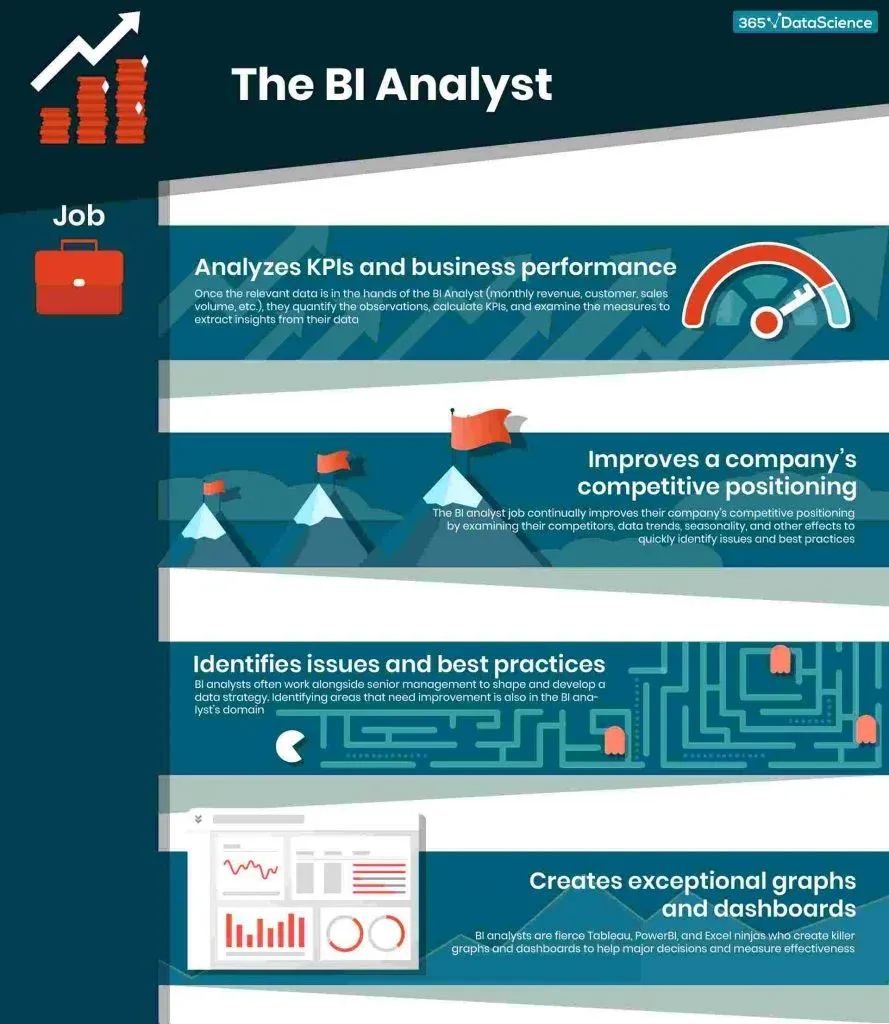
BI Analyst Salary – How much does a BI analyst make?
How much do BI analysts make?
We found the answer in Glassdoor and PayScale.
If you’re new to the profession (with 1 year of experience or less), you can count on \$66,000 average pay. Once you’ve gained a few years of experience and you’ve honed your persuasion skills, your median annual pay can reach \$79,000 (plus \$5,185 average bonus).
Do you want to work in the UK? An entry-level BI analyst can expect to earn an average total pay of £26,000. And, by all means, 1-4 years of experience will grant you an average total compensation of £29,000. Sounds like advanced excel skills truly pay off in the end!
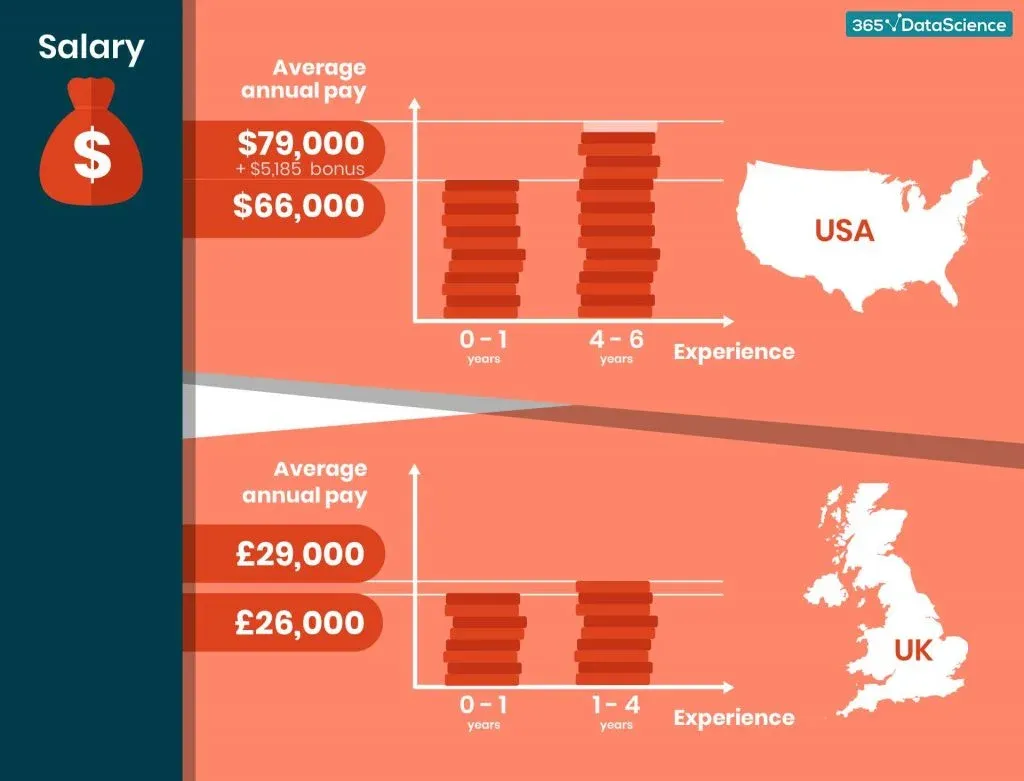
What’s the BI analyst career path?
If you want to pursue the business intelligence analyst career path, you can first consider gaining some experience as a data analyst or a business analyst. A BI analyst career has a lot to offer but you definitely need some high-level skills. So let’s see what education and qualifications will pave your way to success.
How to become a Business Intelligence analyst?
Is the business intelligence career path right for you? Well, if you’re interested in business performance, calculating KPIs and extracting insights from past historical data, this might be an opportunity worth looking into. However, a BI analyst has many other responsibilities and tasks to complete daily. That’s why we created this article - to provide insight into what a BI analyst does, what education and skills you need to fit the bill, and how much you can earn in this role. Practically, everything that will get you past those first initial steps on your way to a new career.
What education do you need to become a BI analyst?
Generally speaking, landing a job as a BI analyst should come relatively easy, if you have a bachelor’s degree in one (or more) of the following:
- computer science;
- engineering;
- mathematics;
- statistics;
- finance;
- business administration;
- economics or related field.
But don’t get discouraged if your background is in contemporary dance or Classical Indian literature.
Fortunately, there are no limits to learning. And it’s never late to acquire the crucial skills for a BI analyst position, such as Excel, SQL, Python, and Tableau. Today, there are plenty of specializations and all-around online certificate courses that will give you the knowledge and confidence required for the job. And here’s a small tip: if you’re new to the data science field, an internship in the financial industry would be a great start. It will help you understand all business processes. Plus, you’ll get an idea of the kinds of projects a BI analyst undertakes.
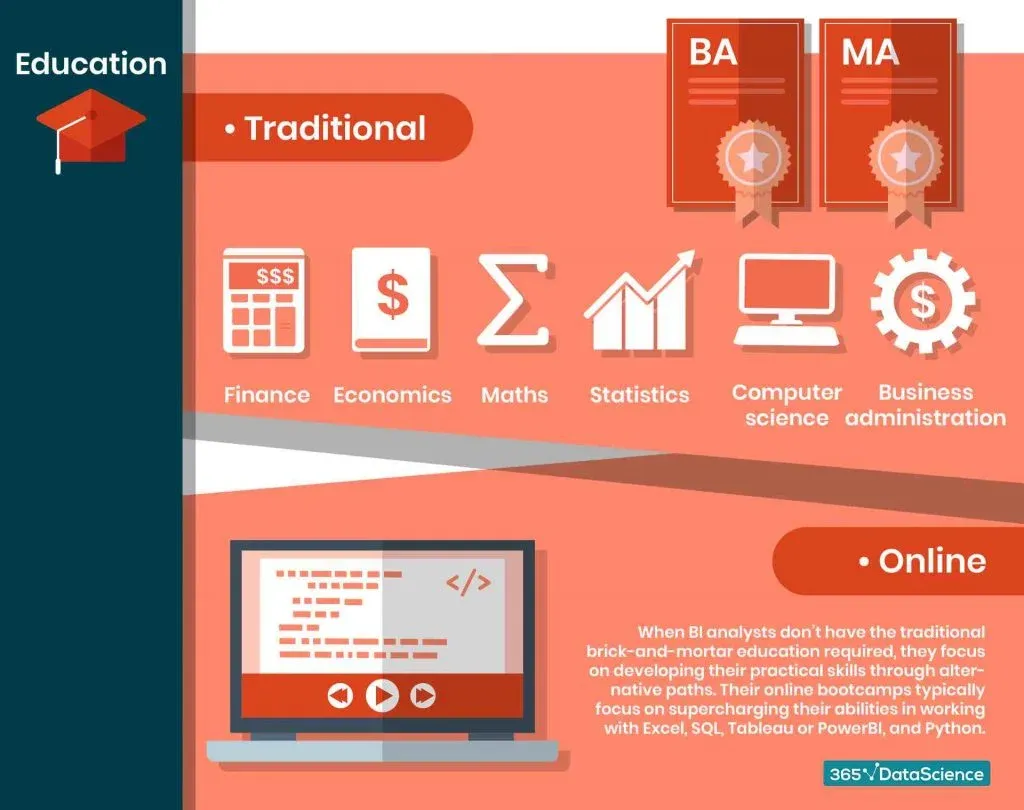
What BI analyst Qualifications you should acquire?
A data science job is all about the skillset, and the BI analyst path makes no exception. So here’s a list of skills you need to become a BI analyst.
Technical skills:
- Advanced SQL Skills;
- Experience with Power BI;
- Advanced Tableau Desktop and Server abilities;
- Advanced Excel skills;
- Programming skills (Python or R are highly desirable);
- Data interpretation and recommendations based on findings;
- Development of graphs, dashboards, reports, and presentations of project results;
- Identification, analysis, and interpretation of trends or patterns in complex data sets.
Practical skills:
- Strong planning and organization skills
- Learning concepts quickly, and applying them to come up with creative solutions;
- Analytical skills;
- Impeccable attention to detail,
- Ability to work independently in a fast-paced and rapidly changing environment;
- Presentation skills;
- Ability to design rich data visualizations and dashboards to communicate complex ideas to business partners and leadership;
- Ability to persuade;
- Flexibility and adaptability.
Soft skills:
- Excellent verbal and written communication skills.
- Ability to work well as part of a team in a high pressure, agile environment;
- Ability to collaborate with Performance Management to understand and analyze data on individual and team performance;
- Willingness to assist and coach other project teams when required;
- Fast in understanding what other people need.
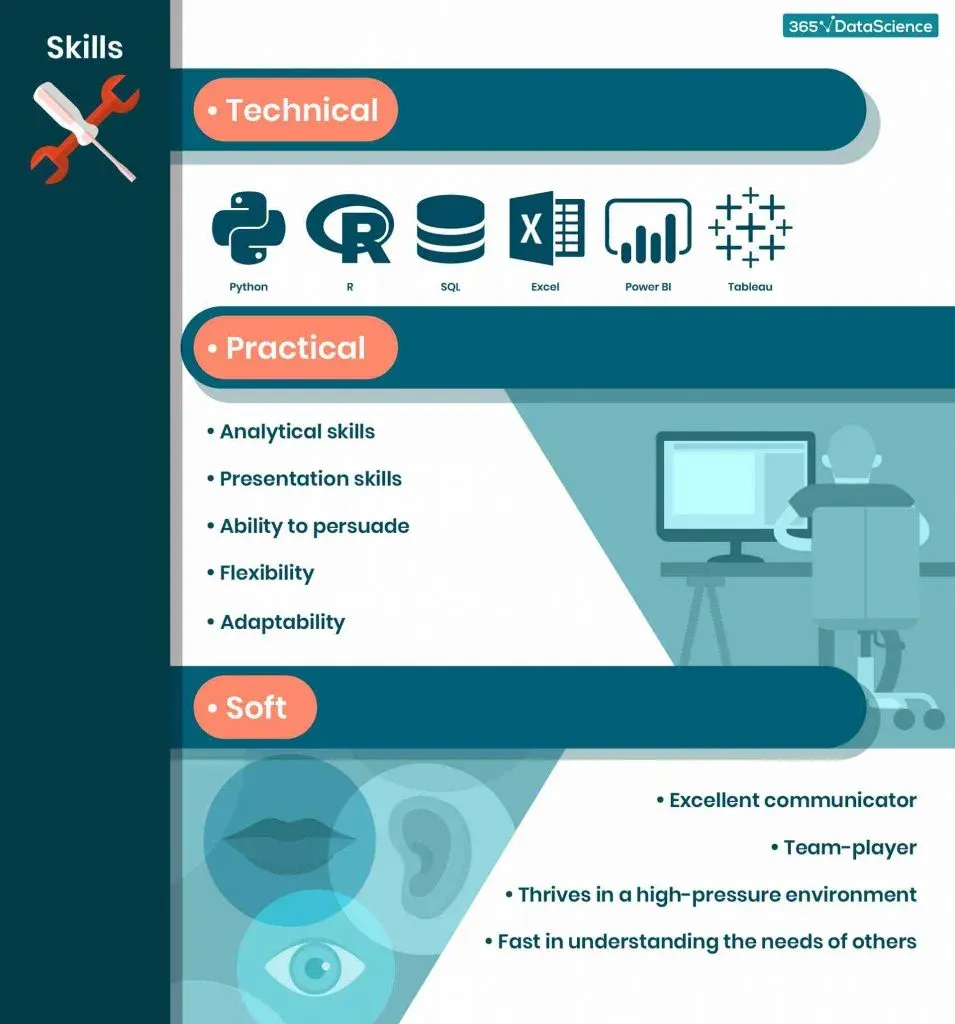
So, now you know what to expect from a BI analyst job and what you need to aim for it. However, some extra career insights are always desirable. So, if you’re motivated to expand your know-how, you can continue to the career-focused sections down the data science career guide. We’re certain they will be a helpful companion on your way to a successful data science career.

Who is a data engineer?
Interested in big data career opportunities? Data engineers are the ones to take things further up the data science pipeline. They use the data architects’ work as a steppingstone and then preprocesses the available data. They are the people who ensure the data is clean and organized and ready for the analysts to take over.
What does a data engineer do?
Data engineers are the Jedi Knights of data science. They rely on a blend of analysis, wisdom, experience, and judgment to make key decisions for a company’s success. A data engineer is a self-starter who is inspired to complete more than your usual number of tasks.
But what does that mean? Let’s briefly go over some of the things a data engineer does.
Data engineers implement complex, large scale big data projects with a focus on collecting, managing, analyzing and visualizing large datasets. All that massive amount of overwhelming raw data? Well, they are the ones turning it into insights using various toolsets, techniques, and cloud-based platforms.
Data engineers are responsible for building and maintaining ETL pipelines which make crucial data accessible for the entire company. They also lend a helping hand to BI analysts by designing and supporting BI platforms. Who makes sure all big data applications are available (and performing properly)? Again, data engineers. And, to top it all, they are great team-players. A data engineer knows how to actively collaborate with data scientists and executives to build solutions and platforms that meet, or even exceed a company’s business needs.
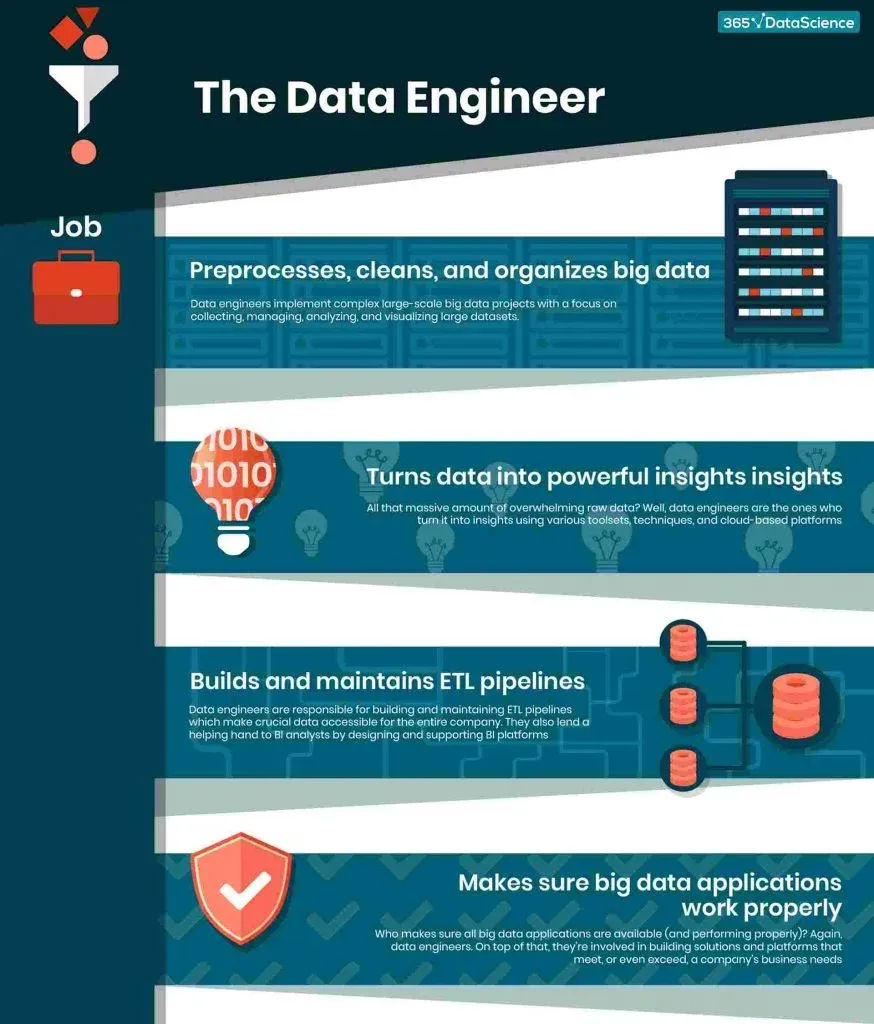
Data Engineer Salary – How much does a data engineer earn?
How much do data engineers make?
We asked Glassdoor and PayScale to give you the answer.
In the U.S., the average pay for a data engineer who’s just getting started in his career is \$103,000. Of course, once you hit the 4-6 years’ experience mark, you can expect your compensation to rise to \$117,000 (plus, you’ll be eligible for additional bonuses in the region of \$10,000).
Looking for a data engineer job in the UK? According to Payscale research, even if you have less than 1-year experience, you can get average pay of £30,000 (this includes bonuses and overtime pay).
Naturally, with experience comes a higher salary. A data engineer with 1-4 years of experience earns an average total compensation of £41,000. And it only gets better! Once you have 5-9 years of experience, your annual pay can hit £54,000. Big data, big rewards!
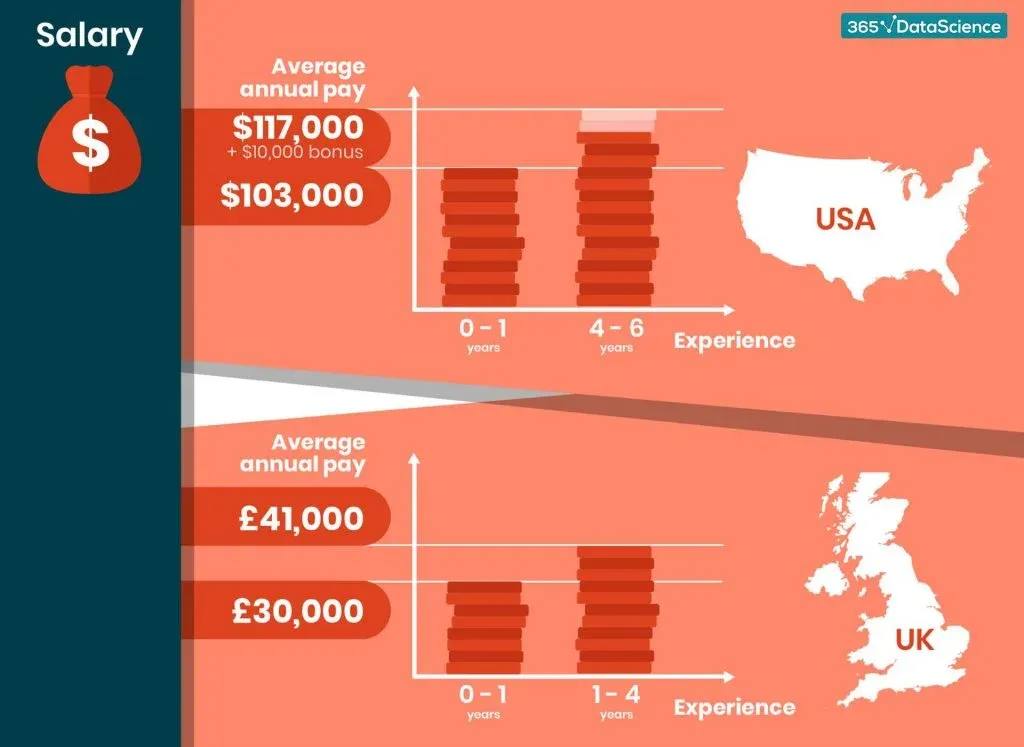
What’s the data engineer career path?
If you’re excited about big data career opportunities, this career path could be the one for you. A developer’s or software engineering experience can be the gateway to a data engineer’s job. But what if you’re new to the field and you’re not sure you’ve got what it takes to get there? Don’t worry. Here are the education and qualifications that will open the door to a data engineer career.
How to Become a data engineer?
The data engineer path is one of the best choices you can make if you’re driven to succeed in the data science field.
But how to become a data engineer?
This overview will help you learn about the responsibilities of a data engineer, the education requirements, the skills you need to acquire (or just sharpen, if you have previous experience) and the expected salary of a data engineer in the U.S. and the UK.
What education do you need to become a data engineer?
A degree in software engineering, computer science, or information technology will give you a flying start. However, if that’s not the case, you can still make the cut. But you need skills in computer programming and software design, statistical modeling and regression analysis, Python, SQL, and Machine learning. Now, before you rush into writing off your dream job, you should know that acquiring these skills is absolutely possible, even for complete beginners. All you have to do is enroll in a qualification program or commit to a comprehensive data science training. Once you follow the curriculum and gain experience with real-world exercises and projects, you will have the skills, confidence, and the portfolio to apply for a data engineer position.
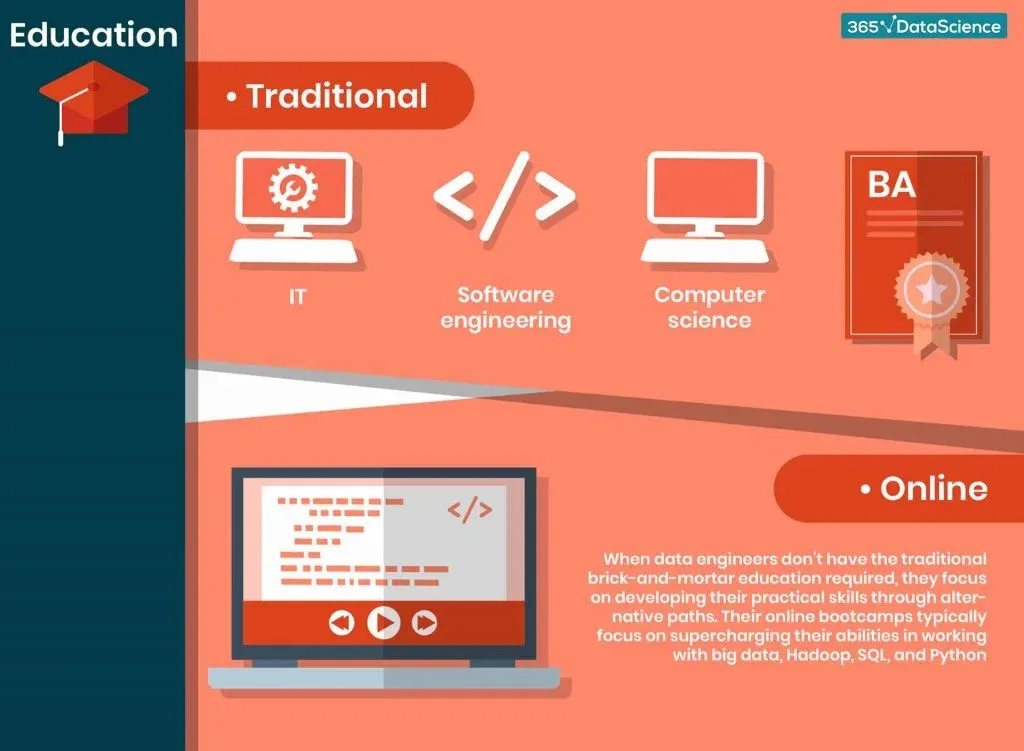
What data engineer qualifications you should acquire?
A data engineer job comes with certain responsibilities. Here’s a list of competences and skills you need to become a data engineer who knows their stuff.
Technical skills:
- Knowledge of data modeling for both data warehousing and Big Data;
- Experience in the Big Data space (Hadoop Stack like M/R, HDFS, Pig, Hive, etc.);
- Ability to write, analyze, and debug SQL queries;
- Experience with at least one scripting language (e.g. Python);
- Mathematics;
Practical skills:
- Data visualization skills in software like Tableau;
- Analytical skills;
- Ability to make sound decisions, even in the absence of complete information;
- Ability to follow through on commitments and make sure others do the same;
- Personal responsibility for decisions, actions, and failures;
- Establishment of clear processes for monitoring work and measuring results;
- Design of feedback loops into work;
- Strong attention to detail;
- Ability to think critically and conceptually.
Soft skills:
- Very strong communication skills in a variety of communication settings: one-on-one, small and large groups, or among diverse styles and position levels.
Well, now you’re in-the-know about what it’s like to be a data engineer and how to get there. Of course, better preparation means higher chances of success. So, if you want to gain more useful insight into your future career options, you can find our resume and portfolio tips in the later sections of the data science career guide. We believe they will give you the information you need to make the first steps into a rewarding data science career.
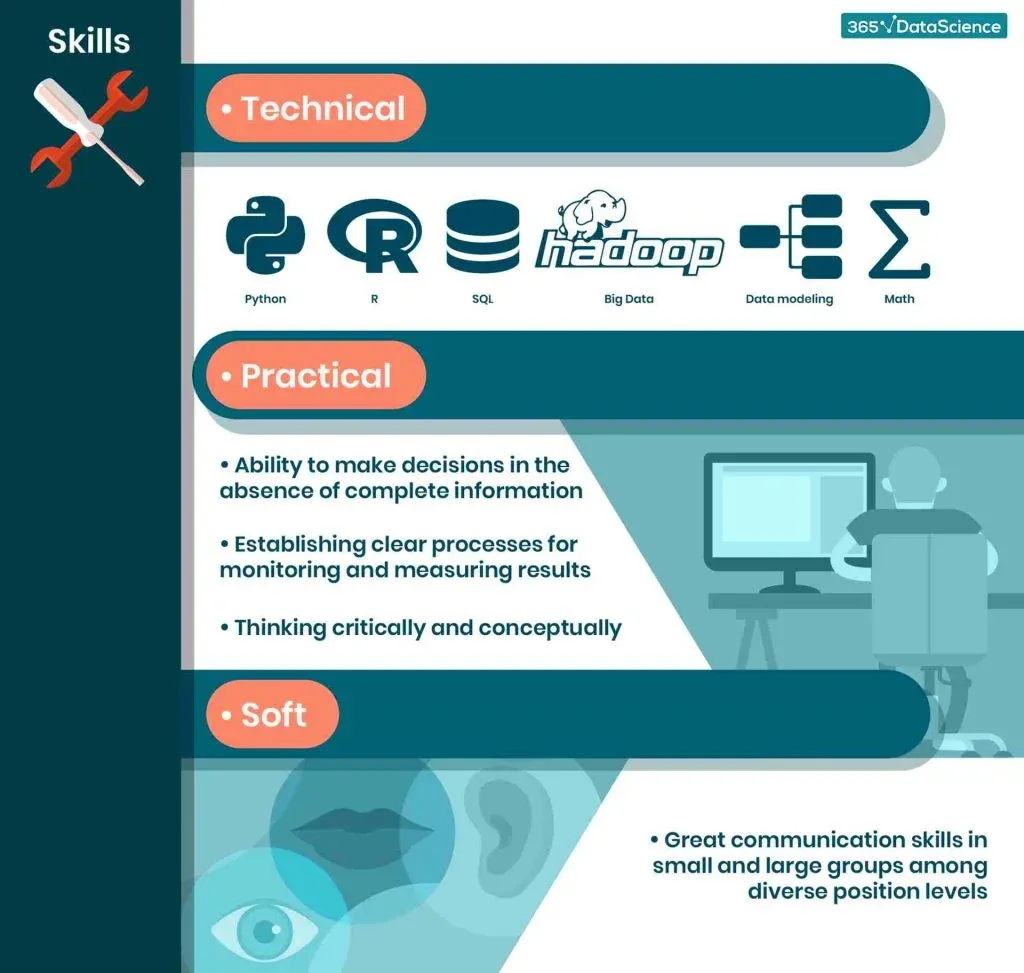
Author’s note:
Some of you may wonder what the differences between a data engineer, a data mining engineer, and a machine learning engineer are. Although they’re all in the realm of data science engineering, these roles all have specific responsibilities that distinguish them from the rest.
Data engineers are typically more focused on back-end solutions and data sources integration.
Data mining engineers, on the other hand, are also involved in developing models to extract actionable insights from a data set (which has already been prepared by the data engineer).
What about machine learning engineers?
Well, if you want to tread the machine learning career path, you’ll certainly need solid knowledge of machine learning theory and understanding of deep learning. However, both aren’t exactly entry-level positions. So, if you want to pursue a data mining career, or land a job machine learning, you can start off with learning the fundamentals of software engineering and gradually build your way up through careers in big data.
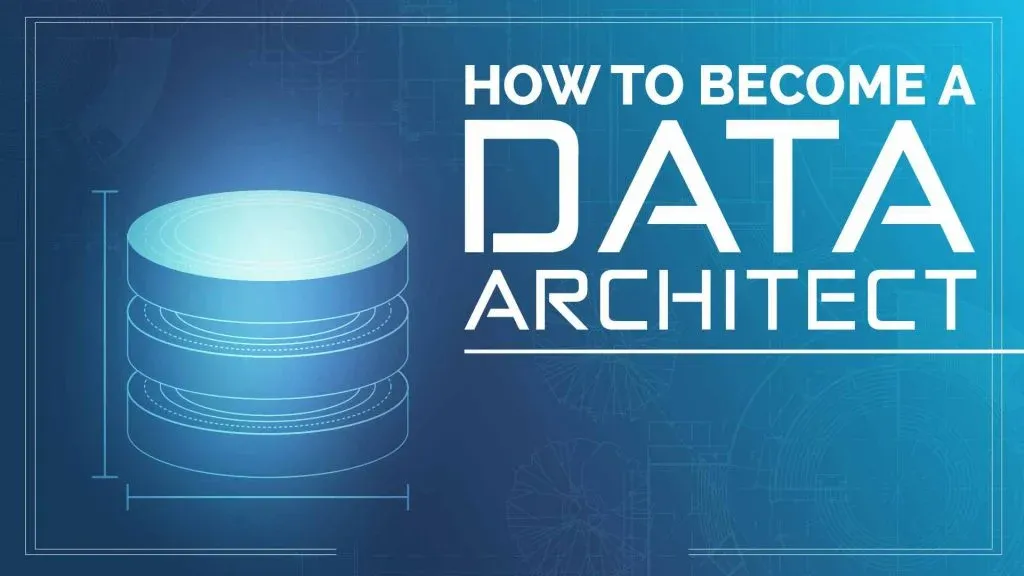
Who is a data architect?
If you’ve seen the 1999 cult movie The Matrix, you probably recognize the Architect as the creator of the utopian world for human minds to inhabit. Much like their blockbuster counterpart, data architects create the database from scratch. They design the way data will be retrieved, processed, and consumed.
What does a data architect do?
Do you have an analytical and creative mind? Are you a problem solver, driven by curiosity and excitement to build complex database systems?
Then you might be perfect for a career as a data architect.
Data architects are technical experts who adapt dataflow management and data storage strategy to a wide range of businesses and solutions. They’re in charge of continually improving the way data is collected and stored. Furthermore, data architects control the access to data (all you corporate spies out there – now you know who to look for).
Data architects are also responsible for design patterns, data modeling, service-oriented integration, and business intelligence domains. They often partner with fellow data scientists and IT guys to reach the company’s data strategy goals.
A data architect constantly seeks out innovations to provide improved data quality and reporting, eliminate redundancies, and provide better data collection sources, methods, and tools.
Author’s note: Sounds like serious business!
Data architect salary – How much does a data architect earn?
How much do data architects make?
We consulted with Glassdoor and PayScale to give you the numbers.
According to Glassdoor’s salaries report, the average annual pay for entry-level data architects in the U.S. is approximately \$104,000, while professionals with 4-6 years of experience make more than \$125,000 (and can easily get bonuses in the region of \$10,000 a year).
What about the UK? As a data architect early in your career, you can earn an average total compensation of £45,000. However, a mid-career Data Architect with 5-9 years of experience can get as much as £55,000 (including bonus and overtime pay). So, you’re in for solid growth!
What’s the data architect career path?
If you want to go into the data architect realm, first you should know what education and qualifications will help you get there.
How to Become a Data Architect?
Are you wondering how to become a data architect?
If you’ve set your data science career goals in that direction, we have two things to say.
First off– great choice! The data architect role is on the rise with its increasing importance for enterprises and their business success. And, second – this article is the right place to start, as it gives you a succinct overview of everything you need to make the first bold steps on the data architect career track.
You will learn about the responsibilities of the data architect job, the education requirements, the necessary skills, and the salary you can expect at various stages of your data architect career.
What education do you need to become a data architect?
If you want to become a data architect, a Bachelor’s degree in information systems, computer science, engineering, or related field will definitely give you a competitive edge. But don’t be quick to despair if you’ve studied something entirely different. It turns out, these are by no means prerequisites to get the job. According to LinkedIn job offers, employers are much more interested in relevant work experience than in shiny degrees. In their own words, “Bachelor degree in Computer Science is desirable, but will waive this requirement entirely if you have significant and applicable real-world experience.” So, how can you get there? Well, first of all, master Python or R, SQL, Tableau, and gain experience in data modeling and machine learning. The good news is, you can build up your knowledge from scratch with some additional qualification courses or by enrolling in an online certificate data science training.
What data architect qualifications you should acquire?
Here are the qualifications and skills you need to become a data architect that truly stands out.
Technical skills:
- Strong data modeling skills;
- Database architecture;
- Data warehousing experience;
- Data governance know-how;
- Experience with Python or R;
- Experience with SQL;
- Good command of data visualization tools (e.g. Tableau);
- Knowledge of data retention concepts and practices;
- Automation of data flows and integrations.
- Understanding of XML and Java.
Practical skills:
- Ability to lead multiple, highly complex efforts simultaneously;
- Establishment and implementation of standards and guidelines;
- Ability to determine key architecture solutions that meet performance, scalability, reliability, and security needs;
- Research and evaluation of emerging data management technologies for applicability and adoption;
- Ability to present technical concepts to upper-level management and officers;
- Ability to work independently;
- Strong problem - solving skills;
- Strong attention to detail.
Soft skills:
- Strong communication skills;
- Provision of technical leadership and guidance to project team as appropriate.
Now you know what it takes to become a data architect. However, some useful career tips are never too much. So, if you want to take your job preparation to the next level, just scroll down the data science career guide. We believe the information on employment opportunities we’ve provided will help you with the first steps into a successful data science career.
What’s the data science job outlook?
Data science is an ever-evolving field, as technologies change quickly. Therefore, you should be prepared that any data science job will require continuous learning and development of competences and skills.
To be a data scientist, or not to be a data scientist, that is the question.
We understand that before you invest all the time and effort into a new data science career, you would want to know if the data scientist job outlook (or any other data science and analytics job outlook) is positive enough to guarantee you secure occupation and future growth.
So, to put your Shakespearean doubts to rest, we decided to dig into the numbers. We used data and insights from the extensive joint research performed by IBM, Burning Glass Technologies, and Business-Higher Education Forum (BHEF) - The Quant Crunch: How the Demand For Data Science Skills Is Disrupting The Job Market.
Here’s everything you need to know about the data science career outlook in a nutshell.
What’s the demand for data science professionals?
According to the report, by 2020 the number of data science and analytics job listings is estimated to grow by nearly 364,000 listings to about 2,720,000 openings. In fact, there is a serious concern that the data science skill gap will continue widening and the supply of data scientist and data analytics career talent won’t be able to catch up to the industries demand. Therefore, now is literally the best time to become a data science specialist.
What’s the future of data science jobs?
Indeed, the future of data scientists and data engineers is brighter than ever. According to the report, they are the jobs most likely to suffer from supply shortages, along with BI analysts and other data science, analytics, and system developer positions. Moreover, the data indicates this tendency will continue to be strong for the years to come.
What’s the job growth in data science?
Once again, we can say that the only way is up when it comes to data science and analytics jobs. As the study shows, the skills projected to grow the fastest include advanced analytical competencies, such as:
- Data science;
- Machine learning;
- Tableau;
- Big data;
- Data visualization;
Of course, skills in SQL, data analysis, financial analysis, data management, mathematics, data warehousing, SQL Server, database administration, business intelligence, and ETL firmly remain among the most demanded analytics skills.
All things considered, the law of supply and demand indicates the data science job outlook is more than optimistic (and so should be you in pursuing your data science career goals).
What data science qualifications will get you on the path to success?
Many aspiring data science professionals get discouraged because they believe the only gateway to data science is a Master’s or a Ph.D. degree. However, this is not the case. In fact, the detailed research we carried out showed the following:
Although some levels of education are preferred in certain industries, a Bachelor’s degree is an adequate ticket to a data science career. In addition, current job postings show an increasing emphasis on skills and related experience rather than on shiny diplomas from fancy universities.
Having said that, let’s take a closer look at the skills, education, and certificates that you need to be an eligible candidate for any data science job.
Education
Let’s call a spade a spade - the path to data scientist success involves a good amount of studying. And, although data science pros come form different backgrounds, there are certain academic areas that will make your entry into data science easier. Those include computer studies, economics, finance, business studies, statistics, and mathematics. Nevertheless, our research shows these are not prerequisites to land a data science job. With that said, you can make up for lost college time by instead gaining the skills required by data science employers.
Skills
Now, whether you choose the role of data scientist, data analyst, or data mining engineer, there’s a basic skill set you must acquire in order to be competitive in the data science job market:
- Excel proficiency;
- Statistics knowledge;
- Maths understanding (specifically calculus and algebra – the subfields that are heavily employed in data science);
- Good command of programming languages, such as SQL, Python, and R;
- Ability to work with visualization tools (e.g. Tableau);
- Machine learning and deep learning fundamentals.
But how do you master all of these if you’re starting from scratch? Fortunately, there is more than one way to learn data science. For instance, you can enroll in a qualification program or study with private tutors. However, if going back to school is not an option, an online certificate program can be the best start of your professional journey.
Certificates
According to The Data Scientist Profile (research based on 1,001 LinkedIn profiles), 43% of data scientists boast at least 1 online course in their resume, with 3 certificates being the average. Furthermore, those include even graduates of prestigious universities! And that is quite an accurate indicator of the importance of self-preparation and a proactive approach towards a data science career.
How to get a job in data science?
If you’ve come this far down the article, it’s safe to say you’re serious about data science as a career. So, without further ado, let’s briefly go through the job application steps that will get you where you want to be.
How to write a data science resume?
They say you only have 3 seconds to make a great first impression. And you can be sure that applies to your job resume, especially in the super-competitive field of data science. A well-thought-out and carefully designed resume isn’t just a pass to a job interview. As a matter of fact, it can pre-determine what questions you will be asked during the interview, and, ultimately, whether you’ll get the welcome-to-the-company handshake. So, if you want to create an outstanding resume that will present you in the best light, you can check out our pro tips and data science resume recommendations. We believe those will prove useful in your job application process.
How to build a data science project portfolio?
While a resume matters, your data science career prospects heavily depend on your project portfolio. Why? Because it’s the real-life proof of what you can do. And that’s what potential employers look for when scouting for data science talent. So, how can you build a project portfolio if you lack previous experience in the field? Here’s what you can do:
- School projects. Those are a good place to start. However, school projects are the fruit of team work and solutions are provided in the end. So, usually, you don’t get to choose the project and you can’t truly showcase your individual talent. It is good practice, to begin with, mostly because there’s always someone you can approach with a question. But overall, it is far better to include personal projects in your portfolio;
- Personal projects. This is where you show what your data science dreams are made of. Personal projects truly set you apart from the rest and demonstrate that you’re serious about getting into data science. Just find a problem you’d like to solve, collect the necessary data, and apply your data science skills to find the solution.
- Course projects. If you’re enrolled in an online data science certificate course, you’ll have the chance to build a portfolio by completing the larger hands-on projects at the end of the course sections.
- Volunteer work. Although work pro-bono isn’t for everyone, some free-of-charge projects for a company or an NGO can do wonders for your data science portfolio. Such experience will add extra points to your resume and will boost your data science skills.
How to prepare for a data science interview?
Data science interviews comprise tons of topics! There are coding and machine learning questions, statistics and mathematics tasks, case study scenarios… Not to mention the background check and behavioral questions that you can’t possibly escape. As always, preparation is key. So, if you want to know what to expect from a data science job interview, you can read more on the subject in our resource Data Science Interview Questions. We believe it will help you maximize your chances to land the job you desire.
Take Your Interview Prep to the Next Level!
Try our AI-powered interview simulator! Customize your interview experience by selecting:
- Your target role
- Dream company
- Interview type (HR or Technical)
- Your background and experience level
Get instant feedback and a detailed score report after each practice session.
How to get a data science internship?
Internships are a great steppingstone that will boost your chances for a successful career in the long run. As an intern, you will not only hone your practical data science skills but will also be able to work on a variety of projects. And, as we mentioned above, the latter is a deal-maker when you apply for a data science job. Is data scientist a good job? An internship at a high-profile company will give you the answer. So, if you want to explore the data science opportunities you’ll get as an intern, learn more in our article How to Get a Data Science Internship.
Which data science industries you should consider?
Where do data scientists work? As it turns out, everywhere! The data boom creates demand for data scientist roles across an ever-growing variety of industries. From Finance and insurance, through Agriculture and Forestry, to Construction – every organization needs solid data science skills to exploit their data and gain a competitive edge. So, what type of data scientist would you like to be? Here are 3 top industries consider:
Finance and Insurance
Finance and Insurance is, in fact, the industry with the highest demand for unique data science and analytics talent. But what distinguishes a financial data scientist? Their experience and financial domain knowledge. So, if you want to earn the title financial data scientist, you should definitely be in-the-know about financial markets, portfolio management, risk analysis, profitability, delinquency, and closure, among other concepts. Now, you have to keep in mind that this is not a job you land without a few years of experience in the field. However, if you start as a financial analyst, study hard, and keep your eyes on the prize, you can certainly work your way up to the coveted financial data scientist position.
Healthcare
According to a study published in the Journal of the American Medical Informatics Association (JAMIA), the healthcare industry’s demand for skilled data scientists is increasing, along with the growing quantity and importance of big data in health care. Big data is the key to discovering innovative solutions and improving the quality of care. At the same time, it can lead to greater efficiency, thus reducing healthcare expenditures. That said, it comes as no surprise that the primary data science skills expected from a healthcare data scientist are: “statistics, R, machine learning, storytelling, and Python.” (Note that this summary is based on the job posting research sample.) Of course, gaining some prior experience as a big data scientist in any other industry will certainly open the door to a data science career in healthcare.
And one last thing! If you want to become a healthcare data scientist, don’t forget honing your data mining skills. This is a specific prerequisite for data science healthcare jobs, as much of the unstructured clinical data is in note format.
Manufacturing
Have you heard about Oden Technologies? This startup company has developed a revolutionary Industrial Internet of Things (IIoT) platform that helps manufacturers optimize their processes and see how the changes they make affect their production in real-time. And that’s just one example of how data science is becoming an indispensable factor for the success of present-day manufacturers.
AI-powered industrial robots, product development, and computer vision monitoring systems are bound to become more common. Which makes perfect sense: they increase quality and thus bring more benefits to the companies. Therefore, if you’re looking for great career opportunities in the long run, manufacturing is definitely an industry you should pay attention to.
Where to find data science positions?
Now you’re aware of your data science job opportunities and how to prepare for all career data science challenges. So, what comes next is finding the right data scientist openings. Here are some helpful tips to get you started in the numerous data science fields.
Where to look for a data science job?
Large job directories, such as Glassdoor, Indeed, and LinkedIn are super popular and are very often the first choice for aspiring data scientists looking for a job. However, limiting your data science job prospects within these platforms is actually counterproductive. Why? On one hand, you will face huge competition for every single job posting, as almost every data science job-seeker is well-familiar with these platforms. On the other hand, a large number of tech companies avoid listing their job offers on these websites. After all, the more applications you receive, the harder it gets to separate the wheat from the chaff. So, what else is out there?
Here are some of the best data science job boards you should bookmark before you send out your resume:
- KDnuggets Jobs
- Analytic Talent;
- Kaggle Jobs;
- DataJobs;
- analyticsjobs.co.uk;
- AnalyticsVidhya;
- Jooble;
- ai-jobs.net;
- Icrunchdata.
How to “decipher” data science job requirements?
With so many types of data scientist jobs out there, understanding the employer requirements in job postings might be puzzling at first. However, there are 3 steps that will help you overcome your initial confusion:
- Keep the industry in mind – job offers always comprise industry-specific concepts. So, if you come across any unfamiliar terms, spend some time researching the company’s field of expertise. This will help you decide whether this data scientist job fits your career needs.
- Break down the job description – data scientists can wear multiple hats, depending on the company’s needs. Every field works with different types of data in order to achieve particular business goals. Therefore, don’t be surprised when you discover that a data scientist’s responsibilities vary greatly across job postings. However, if you take a closer look, you’ll see that there are certain requirements that employers commonly search for in data scientists. So…
- Remember it all boils down to the basics – programming and query languages, and good command of visualization tools are the bread and butter of every data scientist. That said, once you have these skills covered, you’ll be eligible for a data science position in any industry.
What kind of data science organizations you should put on your radar?
When browsing data scientist job openings, it’s important to be in-the-know about the types of data science organizations, what they offer, and if they ultimately suit your career needs. After all, you don’t want to spend hours researching data center careers, when there are plenty other great options out there.
So, here are a few ideas you should definitely consider once you start applying.
Data Science Consulting Companies
Data science consultancies offer outstanding remuneration packages and development opportunities. In fact, if you’re on the career path for data scientist, you shouldn’t sell yourself short. On the contrary – start researching the top companies in the field. This will tell you if a big consultancy is the right environment for you.
Author’s note: If you want to learn more about the big players, you can read our article about the Top 15 Data Science Consulting Companies Hiring Now.
Data Science Startups
You want to explore the data scientist careers off the beaten path? Then a data science startup might be the right place for you. Startups give you the chance to face challenges independently and wear multiple hats. Working in a startup can help you grow your skillset tremendously in a relatively short period of time. This rings especially true if you compare it to working in large corporations where it may take years of repetitive tasks before you climb up the data science ladder.
Author’s note: You can discover which are the most rapidly advancing data science startups in our article Best Startups to Work For as a Data Scientist in 2023.
Government Data Science Jobs
Have you ever considered applying for data scientist government jobs? Although this may not be the most popular career choice, an increasing number of countries realize the importance of data-driven innovation and the socio-economic benefits that it can bring. Which means plenty of data science career opportunities. For example, in their project the U.S. Climate Resilience Toolkit, the U.S. Federal Government has developed a catalog of more than 200 digital tools to boost climate resiliency. And that certainly indicates a positive outlook for data science careers, most prominently data analysis careers, careers in data analytics, and careers in big data analytics.
So, how to get a data science job for the government? As a first step, you can visit the following government jobs directories:
- USA JOBS – if you’re based in the U.S. and you want to explore a wide scope of data science hiring paths;
- The UK – The U.K. government is also recruiting top-notch data science talent (make sure you check for job openings in the Office for National Statistics, the Office of Gas and Electricity Markets, and the Cabinet Office);
- GovtJobsPortal – Although finding a government data science job in India is challenging, there are plenty of IT and computer science positions that can be a great entrance to future data science job openings.
Now that you’re aware of the data science employment options, types of data scientists, roles, career paths, and job outlook, you’re equipped with all the knowledge you need to take the first step on your data science career journey.
However, there’s one more thing to keep in mind – anything worthwhile takes time and hard work. So, keep learning and improving your skills, don’t stay still, master different technologies, and opportunities for a career in data science will show up.
With this guide, we aimed to shed light on everything related to starting a career in data science.
We hope it helps you broaden your perspective. Moreover, we’re positive it will assist you not only in understanding how to be a data scientist, but also in choosing the best career path to enter the data science field.
Final piece of advice? Learn with curiosity and optimism. And don’t be afraid of making mistakes along the way. Just work hard, always do your best, and the rest will follow!






